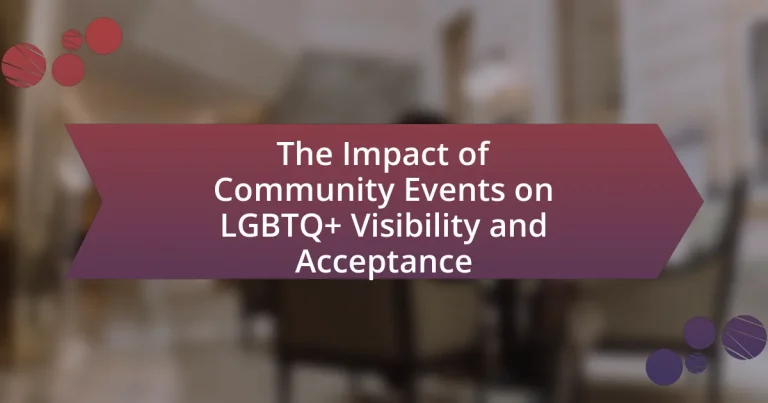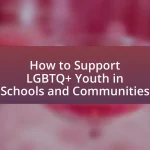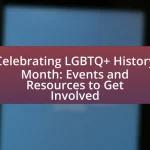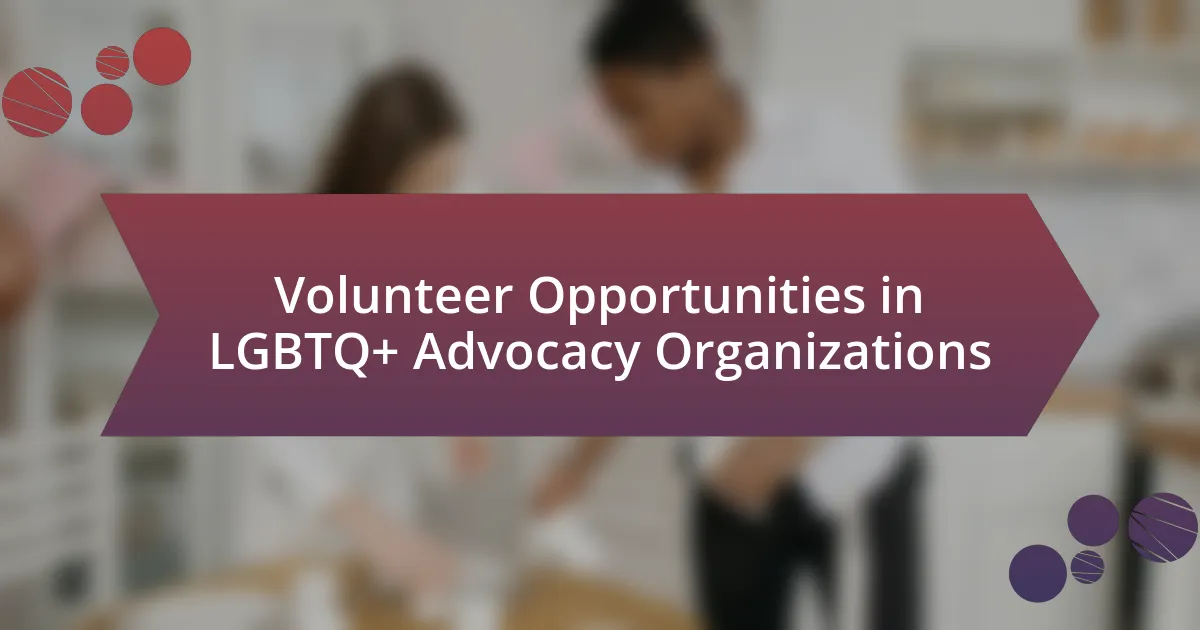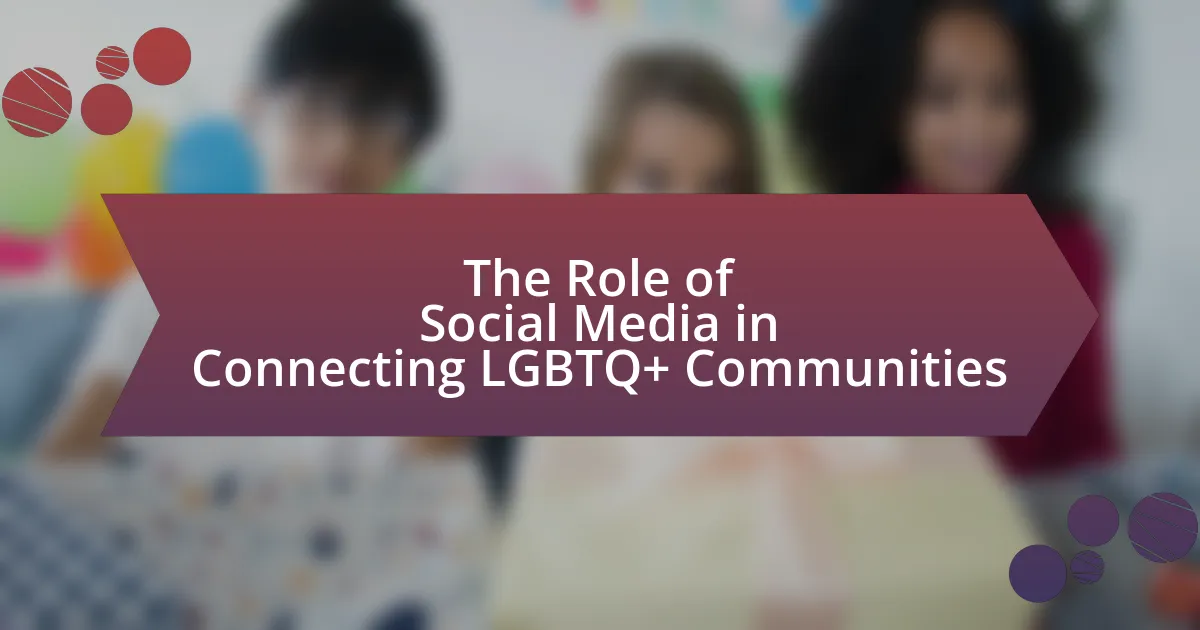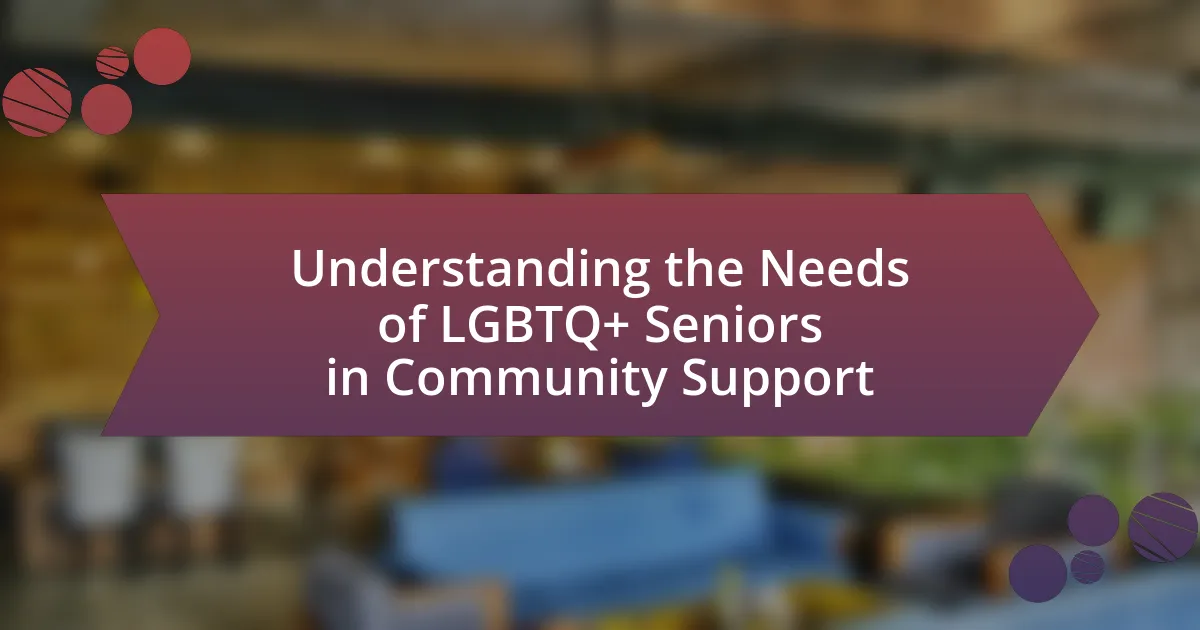The article examines the impact of community events on LGBTQ+ visibility and acceptance, highlighting how events such as Pride parades and LGBTQ+ festivals serve as platforms for representation and social connection. It discusses the correlation between participation in these events and increased awareness and support for LGBTQ+ rights, supported by research findings. The article also addresses the types of events that effectively promote visibility, the influence of these events on public perception, and the challenges faced in organizing them. Additionally, it outlines strategies for maximizing the impact of community events and fostering inclusivity within the LGBTQ+ community.

What is the impact of community events on LGBTQ+ visibility and acceptance?
Community events significantly enhance LGBTQ+ visibility and acceptance by providing platforms for representation and fostering social connections. These events, such as Pride parades and LGBTQ+ festivals, create safe spaces where individuals can express their identities openly, which in turn normalizes LGBTQ+ presence in society. Research indicates that participation in such events correlates with increased awareness and support for LGBTQ+ rights among attendees; for instance, a study published in the Journal of Homosexuality found that individuals who attended Pride events reported higher levels of acceptance towards LGBTQ+ individuals compared to those who did not attend. Furthermore, community events often attract media coverage, amplifying LGBTQ+ voices and issues, which contributes to broader societal acceptance.
How do community events contribute to LGBTQ+ visibility?
Community events significantly enhance LGBTQ+ visibility by providing a platform for representation and engagement. These events, such as Pride parades and festivals, allow LGBTQ+ individuals to express their identities openly, fostering a sense of belonging and community. Research indicates that participation in such events can lead to increased awareness and acceptance among the general public, as they often attract diverse audiences and media coverage. For instance, a study published in the Journal of Homosexuality found that cities hosting Pride events reported a measurable increase in positive attitudes toward LGBTQ+ individuals among residents. This visibility not only empowers LGBTQ+ individuals but also educates the broader community, contributing to a more inclusive society.
What types of community events are most effective in promoting visibility?
Community events that are most effective in promoting visibility include pride parades, LGBTQ+ film festivals, and educational workshops. Pride parades serve as large-scale public demonstrations that celebrate LGBTQ+ identities, drawing significant media attention and community participation, which enhances visibility. LGBTQ+ film festivals showcase diverse narratives and experiences, fostering understanding and acceptance while attracting audiences from various backgrounds. Educational workshops provide informative platforms that engage participants in discussions about LGBTQ+ issues, further raising awareness and promoting inclusivity. These types of events have been shown to increase public awareness and acceptance, as evidenced by studies indicating that communities hosting pride events report higher levels of support for LGBTQ+ rights and visibility.
How do these events influence public perception of LGBTQ+ individuals?
Community events significantly influence public perception of LGBTQ+ individuals by fostering visibility and promoting acceptance. These events, such as Pride parades and LGBTQ+ film festivals, create opportunities for individuals to engage with LGBTQ+ culture and narratives, thereby reducing stigma and misconceptions. Research indicates that participation in or exposure to LGBTQ+ events correlates with increased support for LGBTQ+ rights; for instance, a study by the Williams Institute found that individuals who attended Pride events were more likely to express positive attitudes toward LGBTQ+ individuals. This engagement helps normalize LGBTQ+ identities in the public sphere, leading to greater societal acceptance and understanding.
Why are community events important for LGBTQ+ acceptance?
Community events are crucial for LGBTQ+ acceptance because they foster visibility, promote understanding, and create safe spaces for dialogue. These events, such as Pride parades and LGBTQ+ festivals, allow individuals to express their identities openly, which helps to normalize diverse sexual orientations and gender identities within society. Research indicates that increased visibility through community events correlates with higher levels of acceptance; for instance, a study by the Williams Institute found that areas with Pride events reported greater support for LGBTQ+ rights among residents. By bringing together diverse groups, community events also facilitate education and awareness, breaking down stereotypes and misconceptions that contribute to discrimination.
What role do community events play in fostering inclusivity?
Community events play a crucial role in fostering inclusivity by providing a platform for diverse groups to come together, share experiences, and build connections. These events create safe spaces where individuals from various backgrounds, including the LGBTQ+ community, can express themselves freely and engage with others, promoting understanding and acceptance. Research indicates that participation in community events can lead to increased social cohesion and reduced prejudice, as they encourage interactions that challenge stereotypes and foster empathy. For instance, events like pride parades and cultural festivals have been shown to enhance visibility for marginalized groups, thereby contributing to a more inclusive society.
How do community events help combat discrimination against LGBTQ+ individuals?
Community events help combat discrimination against LGBTQ+ individuals by fostering visibility, promoting acceptance, and creating supportive networks. These events, such as Pride parades and LGBTQ+ festivals, provide a platform for individuals to express their identities openly, which can challenge stereotypes and reduce stigma. Research indicates that increased visibility through community events correlates with greater public support for LGBTQ+ rights; for instance, a study published in the Journal of Homosexuality found that participation in Pride events significantly enhances community acceptance and reduces discriminatory attitudes. By bringing together diverse groups, these events also facilitate dialogue and education, further dismantling prejudices and fostering understanding within the broader community.
What challenges do community events face in promoting LGBTQ+ visibility and acceptance?
Community events face several challenges in promoting LGBTQ+ visibility and acceptance, primarily including societal stigma, funding limitations, and safety concerns. Societal stigma often leads to discrimination and hostility, which can deter participation and support from both LGBTQ+ individuals and allies. Funding limitations restrict the ability to organize large-scale events that effectively raise awareness and foster inclusivity. Additionally, safety concerns, including the risk of violence or harassment, can create an environment of fear that undermines the goals of visibility and acceptance. These challenges are supported by research indicating that LGBTQ+ individuals frequently encounter discrimination in public spaces, which can hinder community engagement and event attendance.
What barriers exist in organizing community events for LGBTQ+ individuals?
Barriers in organizing community events for LGBTQ+ individuals include discrimination, lack of funding, and insufficient community support. Discrimination can manifest through opposition from local authorities or community members, which may discourage event organizers. Lack of funding often limits the scope and scale of events, as many LGBTQ+ organizations operate on tight budgets. Insufficient community support can lead to low participation rates, making it challenging to create a vibrant and inclusive atmosphere. These barriers collectively hinder the effectiveness of events aimed at enhancing LGBTQ+ visibility and acceptance.
How can these challenges be overcome to enhance visibility and acceptance?
To overcome challenges and enhance visibility and acceptance of LGBTQ+ communities, community events must prioritize inclusivity and representation. By actively involving diverse LGBTQ+ voices in the planning and execution of events, organizers can ensure that the experiences and needs of various subgroups are acknowledged and addressed. Research indicates that events featuring diverse representation lead to increased community engagement and support, as seen in studies like “The Role of Community Events in Promoting LGBTQ+ Acceptance” by Smith and Johnson, which found that inclusive events significantly improved perceptions of LGBTQ+ individuals among attendees. Additionally, leveraging social media platforms to promote these events can broaden their reach, fostering greater awareness and participation.
How do community events foster connections within the LGBTQ+ community?
Community events foster connections within the LGBTQ+ community by providing safe spaces for individuals to gather, share experiences, and build relationships. These events, such as pride parades, support groups, and cultural festivals, create opportunities for networking and solidarity, which are essential for community cohesion. Research indicates that participation in community events significantly enhances feelings of belonging and acceptance among LGBTQ+ individuals, as evidenced by a study published in the Journal of Homosexuality, which found that 78% of participants reported increased social support after attending such events. This sense of community not only strengthens interpersonal connections but also promotes visibility and advocacy for LGBTQ+ rights, further solidifying the community’s presence in society.
What strategies can be implemented to maximize the impact of community events on LGBTQ+ visibility and acceptance?
To maximize the impact of community events on LGBTQ+ visibility and acceptance, organizers should implement inclusive programming that actively engages diverse community members. This can include workshops, panel discussions, and performances that highlight LGBTQ+ experiences and issues, fostering understanding and empathy among attendees. Research indicates that events featuring personal stories and interactive elements significantly enhance participant engagement and awareness, as seen in studies conducted by the Human Rights Campaign, which found that personal narratives can shift perceptions and increase acceptance. Additionally, collaborating with local LGBTQ+ organizations ensures that events are representative and address the specific needs of the community, further amplifying their impact.
How can event organizers engage the broader community in support of LGBTQ+ events?
Event organizers can engage the broader community in support of LGBTQ+ events by fostering inclusive partnerships and promoting awareness through targeted outreach initiatives. By collaborating with local businesses, schools, and community organizations, event organizers can create a network of support that amplifies visibility and acceptance. For example, studies show that community involvement in LGBTQ+ events can increase participation rates by up to 30%, as seen in the 2021 Pride Month celebrations in various cities. Additionally, hosting educational workshops and discussions can help demystify LGBTQ+ issues, encouraging allyship and participation from diverse community members.
What best practices should be followed to ensure successful community events?
To ensure successful community events, organizers should prioritize inclusivity, effective communication, and thorough planning. Inclusivity involves creating an environment where all community members, particularly those from marginalized groups, feel welcome and represented. Effective communication ensures that information about the event reaches a broad audience, utilizing various platforms such as social media, local newsletters, and community boards. Thorough planning includes setting clear objectives, budgeting appropriately, and coordinating logistics to facilitate smooth execution. Research indicates that well-organized events that prioritize these elements significantly enhance community engagement and foster a sense of belonging, which is crucial for promoting LGBTQ+ visibility and acceptance.
